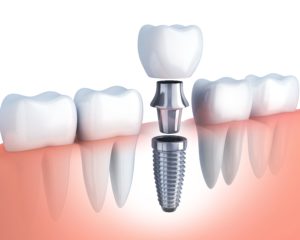
You’ve decided to finally replace that gap in your smile with a dental implant. It will look and feel exactly like a natural tooth, so no one will even be able to tell you had work done unless you tell them. However, just because it looks like a natural tooth doesn’t mean you should treat it the same as the rest of your smile. A dental implant in Greenfield requires special care. Keep reading to learn how to clean around your implant.
How Should I Clean My Dental Implant at Home?
Cleaning your implant at home is almost the same as cleaning your natural teeth. Brush, floss, and use non-alcoholic mouthwash every day. However, keep in mind that bits of food and bacteria can get stuck in the space around the implant. When left untreated, it will cause an infection. Here are a few implant cleaning tools you should invest in:
- Soft-bristled toothbrush: It doesn’t make much difference whether you use a manual or an electric toothbrush on your implant. The important thing is that the bristles are as soft as possible so as not to cause irritation.
- Floss: Dentists generally recommend using unwaxed floss or floss designed specifically for implants. Ask your dentist about which type would be best for your specific implant.
- Water flossers: Water picks with nonmetal tips are great at cleaning out the implant without irritating the gum tissue.
How Can My Dentist Clean My Implant?
After you get an implant, you will be visiting your dentist in Greenfield a lot more often than you normally would. This is to make sure that everything is running smoothly. At your appointment, your dental hygienist will clean the threads of the implant as well as the tissues and natural teeth surrounding it. After you have healed from the procedure, you can treat the implant like the rest of your teeth, meaning getting a cleaning every six months to prevent plaque buildup that could result in an infection.
Why Is It Important to Clean My Implant?
If you neglect to clean your implant, you could develop complications. Your implant could start bleeding, a condition known as mucositis. When caught early, this condition is reversible, but when left untreated, it could cause infection and even loss of bone in the area. You may have to get your implant removed and even have to have a bone graft to make sure you have enough healthy jawbone tissue.
Caring for your dental implant is crucial, just as it is with any other tooth. Get into a good oral hygiene routine to prevent infections and other complications. If you have any more questions, don’t be afraid to ask your dentist for advice on implant maintenance.
About the Author
Dr. David Blanchard has completed more than 150 continuing education hours through the Spear Academy in several areas, including dental implants. He is a member of the American and Wisconsin Dental Associations as well as the Academy of General Dentistry. For more information on how he can help you take care of your dental implant in Greenfield, WI, click here or call (414)-209-7463.

